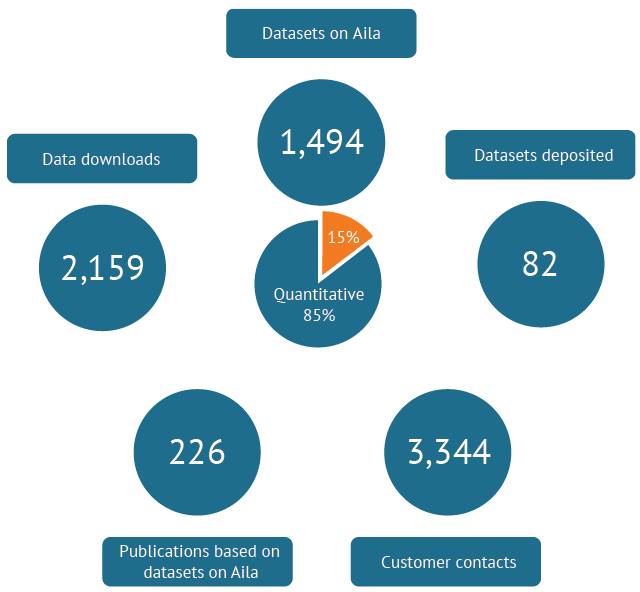Annual Report 2019: Increased international cooperation and updates to services
The year 2019 marked the 20th anniversary of FSD. To celebrate the occasion, the very last issue of the FSD Bulletin recounted the development of the Archive into a highly diverse research service infrastructure. Other festivities, the FSD Anniversary Seminar and the international banquet, were held later in the autumn.

The year kicked off with a promising start when the Finnish Research Infrastructure Committee (FIRI Committee) at the Academy of Finland granted FSD new five-year funding for developing national services. The funding enables the development of the Crossing Boundaries with Tools and Services (C‑BoTS) project, which aims to enhance the interoperability of FSD’s services and visibility of data creators. The project is carried out in line with the FSD strategy for years 2017–2020. The strategy emphasises collaboration, responsible open science and FSD’s role as a service-oriented expert organisation that is responsibly FAIR – all services and data are Findable, Accessible, Interoperable, and Reusable.
National and international cooperation
In line with the FSD strategy, both national and international cooperation were focal points in FSD’s activities in 2019. FSD specialists held presentations in around 30 different events in Finland and abroad and were members in over 40 task groups outside the Archive. As in 2018, around half of the task group memberships fulfilled FSD’s objective of international impact and half focused on national cooperation with an emphasis on responsible open science. Numerous projects that support both national and international cooperation were also developed at FSD in 2019.
The trust and valuation placed in FSD’s expertise by international partners is visible in the various collaborations. FSD and its partners organised two international events in 2019: a cooperation seminar with Japanese colleagues and the 11th Annual European DDI User Conference EDDI19. Additionally, visitors from Sweden, Denmark, Slovenia, Austria, the United States and Qatar, among other countries, travelled to Tampere to learn about FSD’s practices. The noteworthy increase in FSD’s international activities can also be observed in the abundance of virtual meetings in 2019, which nearly doubled compared to 2017.
Updates to services
In 2019, the Data Management Guidelines were updated to be more easily readable and in line with the General Data Protection Regulation (GDPR) of the European Union. Particularly the sections Anonymisation and Personal Data and Informing Research Participants about the Processing of Their Personal Data were revised to include more comprehensive instructions on data minimisation and informing research participants. The guidelines were made more understandable by including various examples and an anonymisation plan template.
Significant changes to day-to-day work came in 2019 with the establishment of the new Tampere University. FSD still operates as an independent institute at the University, but the specialists at FSD are now more involved in projects and task groups within the University to ensure local impact and interoperability. Additionally, all FSD services are now run in the new server infrastructure hosted by the University, which improves reliability, conserves energy, and enables better concentration of FSD’s resources on central functions.
Qualitative data growing in popularity
FSD archived and processed more qualitative datasets in 2019 than in 2018. Users also downloaded qualitative datasets from Aila Data Service more frequently than before, and the use of openly available datasets increased. On the whole, the number of registered users and the reuse of data decreased slightly.
The most popular dataset in 2019 was FSD2922 European Social Survey 2012: Finnish Data, which studied personal and social well-being and opinions on democracy. Of the datasets published in 2019, the most downloaded datasets were FSD3355 Public Procurement Notices 2018, FSD3242 Vocational School Student Survey 2017 and FSD3321 Working and Poor 2015.
Data were widely used in Finnish higher education institutions. The most data were downloaded by Tampere University (18%) and the Universities of Helsinki (14%), Turku (13%) and Jyväskylä (13%). Seven percent of dataset downloads came from registered users abroad (2018: 7%), and one in six datasets were downloaded from the English data catalogue of Aila. A large share of the quantitative datasets archived at FSD are available in English and more are translated on request.